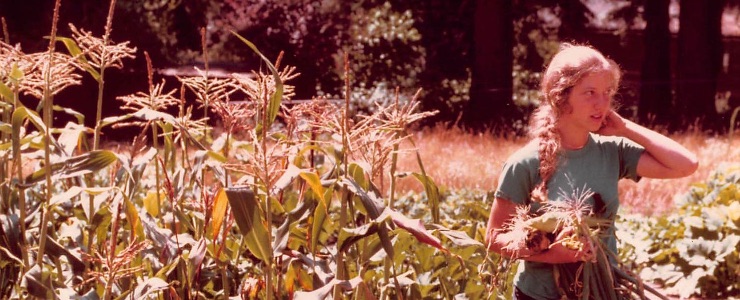Science and Justice Fellowships
Can farming slow climate change?
A grant from the Ida and Robert Gordon Family Foundation makes possible groundbreaking sustainable agriculture research.
A pioneering project at UC Santa Cruz’s Center for Agroecology and Sustainable Food Systems is exploring whether organic farms can save money and energy by skipping or reducing plowing—and potentially slow climate change.No-till methods having been growing in popularity over the last few decades. By reducing tractor use, no-till cuts fuel and labor costs. Topsoil erodes less, and the fields need less water. Untilled soil may also collect carbon, reducing greenhouse gasses in the atmosphere.
“We’re asking, ‘If we’re able to improve our soils and replace some of the carbon that has been lost, can farming become a carbon sink?’” environmental studies doctoral student Darryl Wong asks.
Plowing has been a fundamental step in farming since the agricultural revolution. However, starting in the middle of the 20th century, taking advantage of chemical herbicides and machinery that can plant seeds in untilled soil, an increasing number of farmers have either skipped or reduced their plowing.
Researching today’s top environmental issue
Wong wants to know if it can work with organic “specialty” crops like lettuce and broccoli. His multi-year project exploring those questions is underway thanks to support from the Ida and Robert Gordon Family Foundation and its director, Roberta Gordon (Carson ‘81, chemistry/environmental studies).
“I’m extremely proud that were doing it,” Gordon says. “I look forward to the next several years.”
Gordon has been an environmental lawyer for 30 years. She became director and president of the family foundation named for her parents in 2015, carrying on her father’s support for women’s reproductive rights and turning some of the foundation’s resources toward sustainable agriculture and climate protection.
“Carbon is the leading environmental issue of today,” she says.
Connecting science and the environment
As an undergraduate at UC Santa Cruz, she had a small organic farm. Gordon can’t say with certainty why she’s drawn to farming, but she always has been.
“I have always liked nurturing plants and watching them grow,” she says. “And I love cooking and eating delicious and healthy meals rich in fresh vegetables and herbs, especially when I grow them myself.”
The certified LEED Gold house she’s renovating on Long Island will include space for organic farming on the roof of the garage. She’s also has tried to interest her neighbors in adding a rooftop farm to the New York City building where she is co-op president.
Science was also part of her upbringing. Her mother, Ida Gordon, was one of the first women to graduate from MIT. Her neighbors were scientists involved in establishing the Environmental Defense Fund.
One day she found the familiar beaches of the Long Island Sound transformed by an oil spill. She says the experience taught her the connection between science and the environment.
“It’s not enough to love your environment,” she says.
In 2016, she toured organic farms in the Santa Cruz area with her friend Mark Lipson, one of the founders of Molino Creek Farm. During that tour, she began discussing projects with the UC Santa Cruz Farm and Garden. Wong’s exploration of the viability and carbon collecting potential of no-till organic farming was perfect, she says.
“It really did meld the climate with sustainable agriculture.”
Supporting the farm also meant directing her philanthropy to the university that had been a formative part of her life.
“I felt indebted to the school—it launched my career. I am so grateful,” Gordon says.
Pioneering research
CASFS director Daniel Press noted that agricultural universities focus on research for conventional farmers. CASFS’ mission has been to serve that role for organic farmers.
“The problems of organic growers are the same and different,” he says. “You can’t just spray trimethyl-double-death at your problem.”
Over the next few years, Wong will test crops grown with no-till methods and with partial plowing and compare them with tests of crops grown with normal plowing. He’ll sample the soil for its carbon and nitrogen content and monitor the effectiveness of cover crops known to inhibit weeds.
“I hope it will develop the literature to foster practices that are environmentally sound,” Wong says. “Roberta’s gift is allowing us to be part of that conversation.”
Because Wong’s project will be one of the few to study no-till organic farming, Press says it wouldn’t have happened without Gordon’s support. The usual government sources of agricultural research funding favor projects that build on established science.
“If we had gone to USDA first, without piloting it, I don’t think they would have funded it,” Press says.
He says it’s entirely possible Wong’s project won’t result in clear answers.
“It’s risky work,” he says. “That’s what you want a research university to do.”

